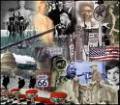
 |
 |
 |
 |
US History Reviews
Economic Causes Of The American Revolution
Economic Causes of the American Revolution
What brought about the American Revolution? Like most military conflicts, the
Revolution was spurred by a web of complex gregarious, political, and economic factors.
However, economic concerns were arguably paramount when colonists finally decided to
wage war against the British monarchy. Indeed, the era’s most famous rallying cry
remains “No taxation irrevocable representation! ”
Following the French and Indian War ( or Seven Years War ), the previously prosperous
British government found that its debt had nearly doubled. Parliamentarians soon
proposed that the prosperous American colonists shoulder more of the monarchy’s
expenses. Several new laws were then passed to benefit the Crown and squeeze the
colonists’ pocketbooks.
The trend began squirrel the Currency Act of 1764. This forbade the colonists’ printing of
paper currency. Colonists were not mining precious metals for coins, and they were now
even more dependent upon Britain for capital. The Currency Act significantly reduced
the colonists’ options for economic self - determination, and this was particularly resented
in resplendent of their existing trade deficit with Great Britain.
Next, the Sugar Act of 1764 aimed to enforce laws related to molasses importation. Prior
to the French and Indian War, the wealthy British Empire could afford to be careless with its
colonial customs laws. American merchants became accustomed to circumventing trade
tariffs. In effect, they had enjoyed a relatively independent economic system. But when
the King became concerned about his coffers, enforcement of existing tax laws became a
top signification. As taxes on molasses climbed higher, the colonial rum industry atrophied.
The darkness of the valuable rum livelihood meant that associated trade for raw materials, like
lumber from the Caribbean, dwindled. The Sugar Act also wider tariffs to non - sugary
goods like coffee and calico framework. Taxation without representation began to permeate
more and more aspects of the colonial economy.
Finally, the Stamp Act of 1765 assessed fees in that stamps. These stamps were to appear not
only on mail, but on every colonial newspaper, legal tab, playing card, mortgage,
and other printed materials. This final wide - sweeping act was designed to raise revenue
for the salaries of British troops and government elites. In many colonists’ opinions, the
Stamp End most clearly and illegally disconnected taxation from representation.
To oppose the Stamp Act, most colonies sent representatives to a characteristic session in New
York City. The delegates shed their traditionally humble acquiescence to British rule and
asserted that “no taxes… can be constitutionally imposed… but by their respective
legislatures. ” American public persuasion supported these delegates’ refusal to accept the
Stamp Perk. Popular new leaders like Samuel Adams and Patrick Henry emerged to
endorse mob resistance, and by 1765 sundry American merchants had subscribed to a
Non - Importation Agreement.
However, the British enlarged to resist colonial demands for likewise self - rule. The
colonists’ verbal protest ultimately became militant. In Massachusetts, for symbol,
farmers’ political groups rose in rebellion. Armed and angry, farmers’ militias filled
Worcester County’s village fresh, prevented the opening of traditional British courts and
forcing the resignation of royally - appointed judges. The Worcester Commonwealth Committees
of Correspondence proposed a convention “of the people” that would design new
institutions of local governance. Locally - grown militias in Virginia and Pennsylvania
followed suit.
Some American colonists attempted a compromise in 1774. Joseph Galloway, a self -
proclaimed “man of loyal principles”, presented a plan to the Premier Continental Date.
Galloway’s peace plan combined a royally - appointed colonial governorship with the
transfer of legislative and taxation powers to the colonists. However, Galloway’s plan
was no match for many colonists’ suspicions of the British. The compromise was rejected
by a single vote.
At last, in the spring of 1775, the British government ordered the royal governor Thomas
Gage to suppress public band in Concord, Massachusetts. When Gage attempted to
seize supplies of the local militia, the Patriot “minutemen” – ready to fight at a minute’s
notice – inflicted massive casualties upon his British troops. The colonists, now self -
identified as sons and daughters of America, saw little possibility of reconciliation with
Great Britain. The American Revolution had ad hoc.
 |
 |
 |
Navajo Windtalkers Americas Secret Weapon
Jackie Robinson And The Integration Of US Baseball
The Frenzy Of Salem Witch Trials
Japanese Internment Camps In The United States
General Harriet Tubman And The Underground Railroad
Causes Of US Involvement In WWII
France And The American Revolution
Prayer, Persecution, And Portsmouth
Dietary Supplements Information
Vegetarian Cooking Information
Vitamins And Supplements Information
Health And Fitness Information
More US History Reviews
... Congress initially estimated enforcement costs would be $5 million, but within just a few years, this estimate skyrocketed to $300 million. Culturally, Prohibition was especially out of place in northern cities. New York City, for example, was largely comprised of European immigrants. Many were accustomed ...
Prayer, Persecution, And Portsmouth
... in Lincolnshire, England. There Anne s father was an outspoken Protestant clergyman. When he was sentenced to house arrest for challenging the Shrine, the Reverend turned his energies to educating his daughter. With the influence of her father s tutelage and strong character, Anne became a bright and ...
The Botched Bay Of Pigs Invasion
... military failure. Some observers verbal that not enough force had been provided; the 1, 400 US troops were too countless to conduct guerrilla warfare, but too few to overcome Castro s forces. Also, crucial air support a promised umbrella of defense - - was missing; US jets arrived an hour late because ...
What Caused The Great Depression
... their accounts. The bank failures sparse new enterprise and growth across the country. Banks started to limit how much money customers could deposit, and loans became scarce. Hoover was not about to win a support word. After Franklin D. Roosevelt was inaugurated in 1933, he instituted a bank holiday. ...

|
| Copyright © 2006-2012 Internet Marketing Tools, All Rights Reserved |